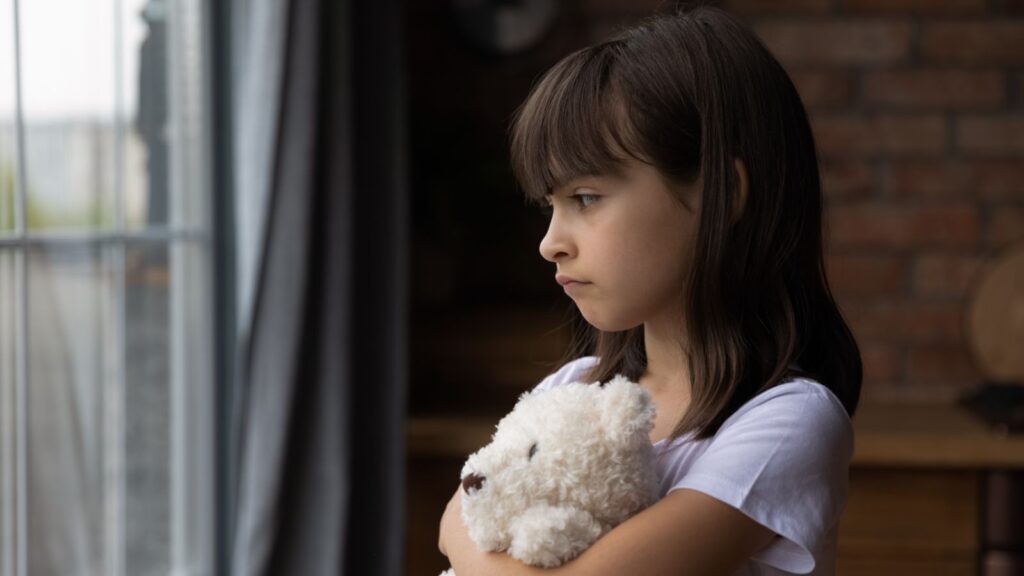While we all wish that every child could grow up in a loving, supportive environment, reality often paints a different picture. Many children face the harsh realities of neglect, abuse, difficult school experiences, or other significant hardships, and these challenging circumstances leave lasting imprints. You may identify with these 18 common traits often seen in individuals who had sad or difficult childhoods.
Anxiety Over Abandonment

People who had sad childhoods may have experienced several situations that left them feeling alone or abandoned. As noted by Verywell Health, this commonly leads to a fear of abandonment in adulthood. This may manifest through a sense of clinginess, hyper-vigilance in relationships, and a strong need for reassurance that others will not leave them.
Heightened Empathy

According to the British Psychological Society, people who have experienced more adversity and suffering in their lives have a greater capacity to empathize with others. This is why they are often more attuned to the feelings and needs of those around them.
Perfectionism

Research indicates that childhood trauma and abuse can contribute to perfectionism. The tendency to strive for perfection can result from overly critical parents who continue to punish and criticize no matter how hard you try.
Resilience

People with sad childhoods have already survived through very challenging times. While it is unfair and regrettable that they were forced to face those difficult circumstances, it also increases their resilience and ability to face adversity in the future.
Difficulty Trusting Others

As you can imagine, if children grow up around adult figures or peers who cannot be trusted to keep their best interests in mind, this can make it much more difficult for them to trust others in the future. It is important that those close to them give them enough time and consistency to allow them to build trust.
High Self-reliance

Kids with sad childhoods are often forced to grow up more quickly than they should, having to fend for themselves and take on adult responsibilities when the parental figures in their lives are not present. This commonly leads them to be highly independent and self-reliant when they grow up, preferring to depend on themselves rather than seeking help from others.
Intense Need for Control

If you grew up in an unstable household, it’s likely that you rarely felt safe or in control of your own life. For this reason, you may have developed a strong need to take control over other aspects of your life.
Sensitivity to Criticism

Speaking of criticism, because those with sad childhoods were often subjected to a great deal of criticism and judgment, they can develop a greater sensitivity to criticism in adulthood. It can be more difficult not to take criticism personally and separate constructive criticism from personal attacks.
Deeply Introspective

It’s important for people who went through adverse childhood experiences to understand and heal from their trauma. This is why they often appear more introspective and reflective than others, taking the time to process their thoughts and feelings and actively seeking out ways of healing from their past.
Compassion for the Underdog

Children who face adverse experiences early in their lives are more likely to identify with those who are marginalized or struggling in their adulthood. This can cause them to have more understanding and compassion for those they see as underdogs.
Strong Sense of Justice

Sadly, those who had sad childhoods likely faced many injustices when they were growing up. For this reason, they may be more sensitive to issues of fairness and equality, fighting for those whom they see as being wronged in some way.
Creativity as an Escape

As a child, no matter how hard your life may be, it is often impossible to physically escape from your situation. Instead, children experiencing trauma or difficulties often escape mentally and emotionally, creating fantasy worlds to help them escape from their difficult realities.
Propensity for Melancholy

Sad childhoods are not always easy to overcome. When you’ve never really felt like your life will go right or you’ll have things to look forward to, this can contribute to a melancholic or pessimistic outlook on life and relationships.
Desire for Authenticity

It’s often important for people who have suffered in their childhoods to find a sense of genuine connection, honesty, and understanding among those around them. This can help them make up for their feeling that they could not be themselves when they were younger.
Guarded Optimism

Even when adults who had sad childhoods are hopeful about the future, they may be cautious about being overly optimistic. This is because they learned as children that disappointment and adversity are always around the corner, and getting your hopes up only for them to be dashed time and time again can be very painful.
Intuitive Understanding of Others

People who had sad childhoods often have a strong intuitive understanding of others and their emotions. This ability to read those around them is commonly developed through their childhood need to remain vigilant of their environments and the adults in their lives, scanning for any signs of potential danger.
Overwhelming Sense of Responsibility

Kids who were forced to feel overly responsible for the people in their lives at an early age are likely to display this same sense of over-responsibility in their adulthood. They may also find it difficult to let go and allow others to take their fair share of responsibility.
Hyper-Awareness of Their Environment

The Cleveland Clinic asserts that hypervigilance is strongly linked to childhood trauma. This is because when we grow up in unsafe and unstable environments, we learn that we must constantly scan our surroundings for signs of danger in order to remain as safe as possible.







